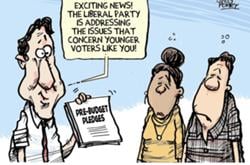Chris Turner's The War on Science: Muzzled Scientists and Wilful Blindness in Stephen Harper's Canada is a solidly researched, well-written book that had to be published. But the people who should read it are not interested in what it tells them about themselves.
If anything has marked the seven years of Conservative rule, it's been the Tories' willingness to repudiate not just previous Liberal and Progressive Conservative governments, but the whole of history since the 18th-century Enlightenment. They're a political vindication of Newton: for every action, there's an equal and opposite reaction.
In this case, the reactionaries are carrying us back to sometime around 1513, before ideas like reason and empirical research became the basis for understanding the world. Like counterparts around the world -- the Tea Party in the U.S., for one -- they are happy to use the products of science to promote their deeply anti-science beliefs: television, radio, the Internet. But to the reactionary, science is valid only to the extent that it extends the rule of reaction.
This attitude is so foreign to the majority of Canadians that we can't quite believe the Tories are serious. So while they move step by step into the past, we stand by, bemused, and let them drag us with them.
This passive response is what journalist Chris Turner is trying to overcome. But he is preaching to the converted.
Forgetting yesterday's outrage
For the converted, Turner's sermon is useful because modern media induce lapses in our short-term memory. The Next Big Outrage makes us forget the Last Big Outrage: the shutting-down of the Experimental Lakes Area, the ending of the long-form census, the silencing of scientists who had something inconvenient to tell us.
Those are just a few of the follies Harper's government has inflicted on us since 2006. The worst of those follies were camouflaged in the 2012 omnibus budget, which sabotaged so many research and environmental concerns that no one could find a single issue that would make Canadians understand what they were losing.
Ever since the early French settlements, Turner points out, mapping and exploration were scientific projects. But the scientists were educated priests, officers, and administrators. After the British conquest, the Scots traders who moved west needed facts and numbers to send home to the Hudson's Bay Company, and that meant a literate, numerate management.
When Sir Robert Borden became Conservative prime minister in 1911, Turner tells us, he saw that Canada needed a non-partisan bureaucracy to tell its rulers just who, and what, they were ruling.* Objective facts would drive Canadian policy for most of the 20th century, expressed by experts who told truth to power because it was in the job description.
Borden's support for science and "objective competence" took Canada from a big colonial woodlot to a formidable military force at Vimy Ridge and a grain-growing agricultural power that fed even the Soviets and the Chinese. In population, we were a featherweight; in science and technical expertise, we could build and operate one of the world's biggest navies during the Second World War.
Then we went on to build the most advanced fighter plane in the world, the Avro Arrow, before Diefenbaker shut it down. And that, in turn, led to the migration of a generation of engineers and scientists to the U.S., where they helped NASA put men on the moon.
A lost generation
Something similar, Turner argues, is happening again: as labs and programs are shut down, another generation of scientists is disappearing. Some are retiring, with no one to move up to replace them. Others are going elsewhere. As David Schindler, the founder of the Experimental Lakes Area, told Turner, pay scales for government scientists have been slipping for years, falling behind the universities: "So there will be a huge decrease in the available talent within federal departments, at least in environmental sciences," Schindler said.
Those departments remaining, meanwhile, will do little pure research. Instead they are to serve as the "concierge" for industry, finding answers to corporations' immediate problems in resource extraction.
What would possess the Conservatives to conduct such policies with such deliberate and meticulous care? At times Harper's cabinet has included trained scientists and doctors, and the Conservatives are quick to rely on science and technology to produce and disseminate their message.
Turner's expression "wilful blindness" is well chosen. The Conservative war on science and scientists is a kind of backhanded tribute to the persuasive power of research and reasoned argument. Precisely for that reason, they don't want Canadians to hear it.
Like George W. Bush's followers who thought they could create their own reality, Harper and his government have created a fantasy world in which Canadians' only purpose is to dig or pump stuff out of the ground, sell it, and live happily ever after. Never mind the environmental or climatic consequences; if we don't have data on those consequences, they're not real.
Making a killing
Of course, this approach seems senseless to reality-based Canadians. Perhaps an analogy will help explain it.
Ivory poachers know perfectly well that their jobs will end when they've shot the last elephant. But as the number of elephants falls, ivory only increases in value. So rather than try to make a steady living, they go for a big killing.
Something like that attitude (it's not even an ideology) seems to dominate the Harper agenda, and hard data only get in the way of the Conservatives' big killing. Shut down the sources of hard data, distract voters with endless talking points about jobs and growth, make a fortune. Today is payday, and tomorrow can take care of itself.
Harper has waged a seven-year war of attrition against science, relying on the backing of an ignorant or short-sighted minority of voters. Even if the majority gets its act together and ousts the Conservatives in 2015, we will be a long, long time repairing the damage.
*Correction Nov. 1, 11:55 a.m.: Borden became Canada's prime minister in 1911, not 1896 as previously stated. ![]()
Read more: Federal Politics, Science + Tech

















Tyee Commenting Guidelines
Comments that violate guidelines risk being deleted, and violations may result in a temporary or permanent user ban. Maintain the spirit of good conversation to stay in the discussion.
*Please note The Tyee is not a forum for spreading misinformation about COVID-19, denying its existence or minimizing its risk to public health.
Do:
Do not: